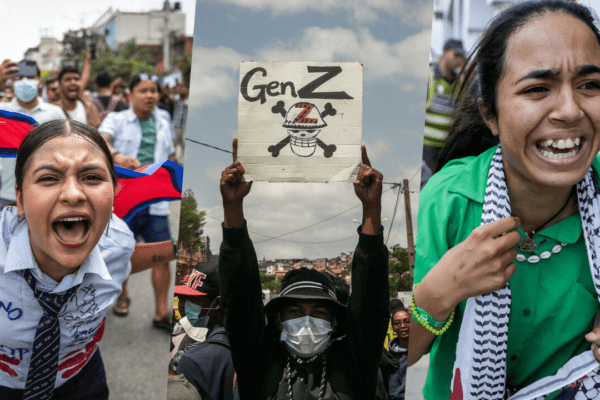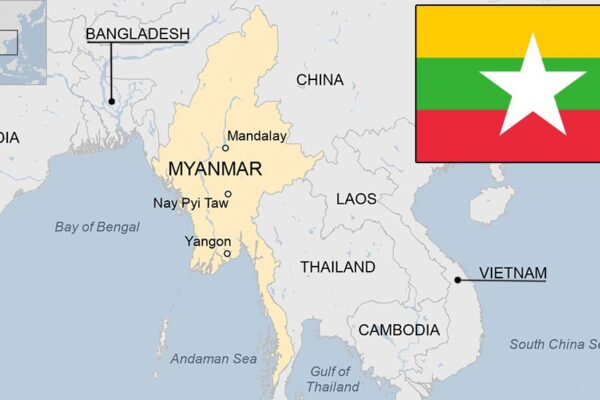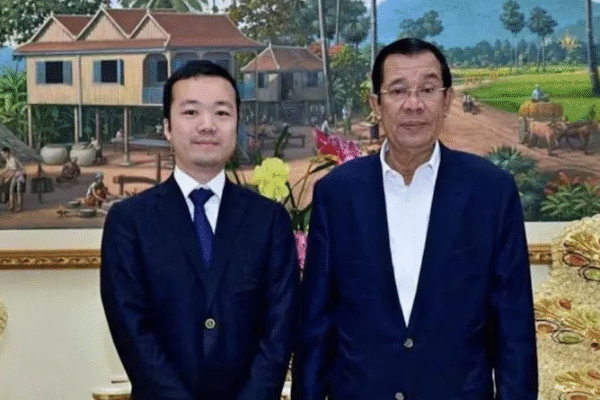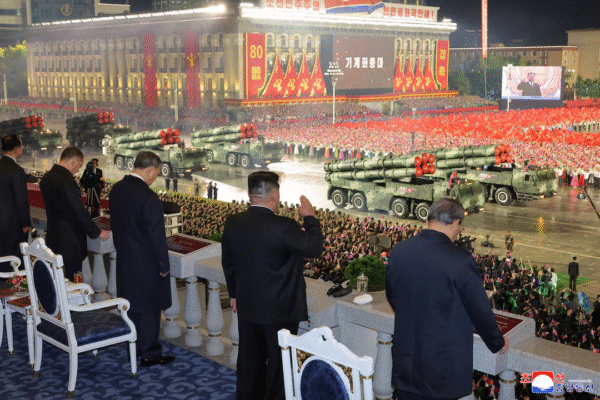
China Says Its Weapons Sales Are Not Linked to Cambodia–Thailand Clashes
China denies links between its arms trade and the escalating Cambodia–Thailand border conflict, as Beijing pushes ceasefire talks amid rising regional tensions.

China denies links between its arms trade and the escalating Cambodia–Thailand border conflict, as Beijing pushes ceasefire talks amid rising regional tensions.

Survey of 10,000 respondents across seven regions examining causes, outcomes and lasting effects of Gen Z–led protests — and the central role of social media.

She Zhijiang, a fugitive-turned-investor, is behind Southeast Asia’s controversial Asia Pacific New City, criticized as a hub for gambling and fraud. Explore the connections, arrests, and shadowy networks behind the project.
Protective measures taken with hope of rebuilding news operations in future WASHINGTON – With the government shutdown and delay in receiving funding for the new fiscal year, effective Oct. 31, Radio Free Asia (RFA) will halt all production of news content for the time being. The move is part of a plan for the Congressionally-funded private corporation to implement cost-saving measures that can help sustain the organization should appropriated funding streams resume. President and CEO Bay Fang issued the following statement: “Because of the fiscal reality and uncertainty about our budgetary future, RFA has been forced to suspend all remaining news content production – for the first time in its 29 years of existence. In an effort to conserve limited resources on hand and preserve the possibility of restarting operations should consistent funding become available, RFA is taking further steps to responsibly shrink its already reduced footprint. “This means initiating a process of closing down overseas bureaus and formally laying off furloughed staff and paying their severance – many of whom have been on unpaid leave since March, when the U.S. Agency for Global Media unlawfully terminated RFA’s Congressionally appropriated grant. “However drastic these measures may seem, they position RFA, a private corporation, for a future in which it would be possible to scale up and resume providing accurate, uncensored news for people living in some of the world’s most closed places.” During its tenure, RFA’s groundbreaking reporting on the Uyghur genocide in Xinjiang, the CCP’s cover-up of COVID-19 fatalities, the unfolding crisis in Myanmar since the 2021coup, Chinese hydropower projects in the Tibetan regions, and the journeys of North Korean defectors has built a public record of transparency in some of the world’s most repressive places, holding autocrats and elites accountable to their people and internationally. Other measures to conserve resources on hand include ending leases of overseas offices and bureaus in Dharamsala, Taipei, Seoul, Istanbul, Bangkok, and Yangon. In the last five years, RFA created new editorial units focused on China’s malign influence in the Indo-Pacific region and globally, investigating PRC secret police stations in the United States and Europe, election interference by the Chinese Communist Party in Taiwan and other Asian countries, and PRC influence operations in Pacific island countries. RFA’s incisive brand of journalism has made it and its journalists a constant target, with its reporters facing pressure and threats since its inaugural report in Mandarin was heard in China on Sept. 29, 1996. Authorities in China, Vietnam, Myanmar, and Cambodia have detained family members, sources, reporters, and contributors. Listeners in North Korea have been severely punished and reportedly executed for accessing RFA’s reports. Nevertheless, RFA’s journalistic operations have until now withstood government intimidation and attacks. In the months since the USAGM illegally terminated its Congressionally appropriated grant to RFA, and despite layoffs and furloughs that diminished editorial staff by more than 90%, the private grantee has continued to fulfill its Congressional mandate to provide accurate, timely news to people living in some of the most closed media environments in Asia thanks to a preliminary injunction issued by the United States Federal District Court for the District of Columbia, which USAGM has appealed. RFA has also continued to win awards for its reporting, including two national Edward R. Murrow awards in August and a Gracie Award in March. While many services, including RFA Uyghur and Tibetan, have already gone dark, others have continued to produce limited output, including RFA Burmese, Khmer, Korean, Mandarin Chinese, and Vietnamese. But these will cease on Oct. 31. We are : Investigative Journalism Reportika Investigative Reports Daily Reports Interviews Surveys Reportika

The U.S. and China appear close to averting a 100% tariff showdown after Treasury Secretary Scott Bessent said a “substantial framework” has been reached. Trump and Xi are expected to meet this week in South Korea to finalize details of the deal.
Myanmar’s junta said on Monday it raided one of the country’s most notorious cyberscam centers and seized Starlink satellite internet devices. Myanmar government media The Global New Light of Myanmar said the military “conducted operations in KK Park near Myanmar-Thai border” and had “seized 30 sets of Starlink receivers and accessories,” according to the AFP news agency. AFP said that number is only a fraction of the Starlink devices they identified using satellite imagery and drone photography. On the roof of one building alone in KK Park, images showed nearly 80 of the internet dishes. This Sept. 17, 2025, photo shows what appears to be Starlink satellite dishes on the roof in the KK Park complex in Myanmar’s eastern Myawaddy township, as pictured from Mae Sot district in Thailand’s border province of Tak.(Lillian Suwanrumpha/AFP) The U.S. Congress’ Joint Economic Committee told the AFP news agency they have begun an investigation into Starlink’s involvement with the centers. While it can call owner Elon Musk to a hearing, it cannot compel him to testify. Starlink parent company SpaceX did not immediately respond to a request for comment on Monday. In this Feb. 20, 2025, image released by the Chinese government, a group of 200 Chinese citizens suspected of involvement in scam centers are returned to Nanjing, China under the escort of Chinese police after being repatriated from Myawaddy in Myanmar.(Yin Gang, Xinhua via Getty Images) With reporting by AFP. We are : Investigative Journalism Reportika Investigative Reports Daily Reports Interviews Surveys Reportika

The European Union’s Special Representative for Human Rights Kajsa Ollongren said on Thursday that they would not send observers to an election in military-ruled Myanmar, as it was unlikely to result in a credible outcome, according to the Reuters news agency. It follows Myanmar junta chief Min Aung Hlaing admitting on Wednesday that the military-backed administration will be unable to conduct an upcoming general election across the entire country, as a civil war triggered by a 2021 coup rages on. Detained Myanmar State Councilor Aung San Suu Kyi and president Win Myint during their first court appearance in Naypyidaw, May 24, 2021.(Myanmar Ministry of Information via AFP) The military doesn’t control all of Myanmar. Vast swaths are administered by a range of armed militias, ethnic groups and pro-democracy fighters, some in open, armed conflict with the ruling junta. The junta has invited ASEAN countries to send observers for the election, due to start on December 28 and to continue in phases into January. We are : Investigative Journalism Reportika Investigative Reports Daily Reports Interviews Surveys Reportika

The U.S. and British governments on Tuesday announced a sweeping crackdown on cyber-scam networks in Southeast Asia accused of luring workers with fraudulent job ads or fake romantic relationships, forcing them to extract billions from people across the world through a range of deceptions, then laundering the money they received.

Nuclear-armed North Korea displayed its most advanced Hwasong-20 intercontinental ballistic missile, described by the North Korean government as the country’s “strongest nuclear strategic weapon system,” state media said on Saturday.